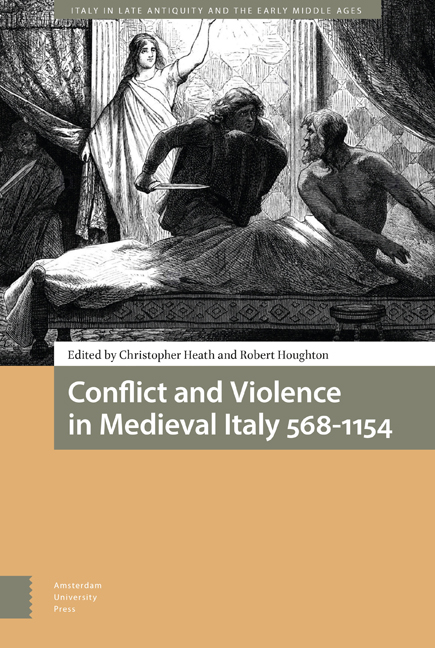Book contents
- Frontmatter
- Table of Contents
- Abbreviations
- Preface
- 1 Introduction: Discordant Minds and Hostile Nations
- 2 Morbidity and Murder: Lombard Kingship’s Violent Uncertainties 568-774
- 3 Insurgency and Counterinsurgency in Lombard Italy (c600-700)
- 4 Troubled Times: Narrating Conquest and Defiance between Charlemagne and Bernard (774-818)
- 5 ‘Nec patiaris populum Domini ab illis divinitus fulminandis Agarenis discerpi’: Handling ‘Saracen’ Violence in Ninth-Century Southern Italy
- 6 Formosus and the ‘Synod of the Corpse’: Tenth Century Rome in History and Memory
- 7 Sex, Denigration and Violence: A Representation of Political Competition between Two Aristocratic Families in Ninth Century Italy
- 8 ‘Italy and her [German] Invaders’: Otto III’s and Frederick Barbarossa’s Early Tours of Italy – Pomp, Generosity and Ferocity
- 9 ‘I Predict a Riot’: What Were the Parmense Rebelling Against in 1037?
- 10 The Strange Case of Deusdedit and Pandulf: Two Accounts of Honorius II’s Election
- Afterword
- Index
2 - Morbidity and Murder: Lombard Kingship’s Violent Uncertainties 568-774
Published online by Cambridge University Press: 07 September 2022
- Frontmatter
- Table of Contents
- Abbreviations
- Preface
- 1 Introduction: Discordant Minds and Hostile Nations
- 2 Morbidity and Murder: Lombard Kingship’s Violent Uncertainties 568-774
- 3 Insurgency and Counterinsurgency in Lombard Italy (c600-700)
- 4 Troubled Times: Narrating Conquest and Defiance between Charlemagne and Bernard (774-818)
- 5 ‘Nec patiaris populum Domini ab illis divinitus fulminandis Agarenis discerpi’: Handling ‘Saracen’ Violence in Ninth-Century Southern Italy
- 6 Formosus and the ‘Synod of the Corpse’: Tenth Century Rome in History and Memory
- 7 Sex, Denigration and Violence: A Representation of Political Competition between Two Aristocratic Families in Ninth Century Italy
- 8 ‘Italy and her [German] Invaders’: Otto III’s and Frederick Barbarossa’s Early Tours of Italy – Pomp, Generosity and Ferocity
- 9 ‘I Predict a Riot’: What Were the Parmense Rebelling Against in 1037?
- 10 The Strange Case of Deusdedit and Pandulf: Two Accounts of Honorius II’s Election
- Afterword
- Index
Summary
Abstract
The Edictum Rothari presents a useful window on the mechanics of Kingship and Law in Lombard Italy. Whilst those who conspire against the life of the king shall be killed, those who, on the contrary, receive advice to kill another third party from the king ‘shall not suffer any payment or trouble’ for ‘the heart of the king is in the hand of God’. Violence at the heart of the Lombard kingdom is a recurrent theme throughout its’ existence. This need not, however, colour perceptions of Lombard geo-politics since endemic competition for power and control is equally noticeable in comparable so-called ‘successor’ kingdoms. Using narrative and normative texts this chapter will consider the role of violence in Lombard society.
Keywords: Kingship; Lombards; Paul the Deacon; Political violence
One of the first general histories of Italy in English by Sir William Thomas (c.1507-1554) was published in 1549. His ‘The History of Italy: A Book exceedingly profitable to be read…’ concerned itself with the governance of Italy and with providing favourable comment on Italian wealth, cultivation and political structures and processes for English readers. It did not, however, dwell upon the rule of the Lombard kings in the north and the centre of the peninsula between 568 and 774, save to present a rather thin catalogue of rulers. Such details as Thomas does supply appear to be entirely dependent upon the text of Paul the Deacon's (c.730-c.796) Historia Langobardorum. The activities of the Lombard kings and the nature of their kingship is the principal strand that operates throughout Paul's HL. Consideration of and commentary on the organic functions of the Lombard Kingdom continue to depend upon Paul's narrative and are often affected by his anecdotal approach to events at the centre of the Lombard regnum. If one seeks to get to grips with the elusive reality of Lombard kingship one must exercise caution in adopting Paul's comments at face value. Yet the aim of this chapter, notwithstanding the murky quality of the operation and experience of power in Lombard Italy, is to consider one aspect of those mechanisms that affected the capacity and governance of the Regnum.
- Type
- Chapter
- Information
- Conflict and Violence in Medieval Italy 568-1154 , pp. 63 - 86Publisher: Amsterdam University PressPrint publication year: 2021



